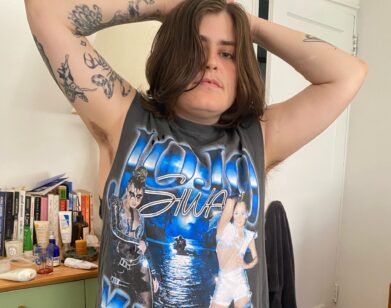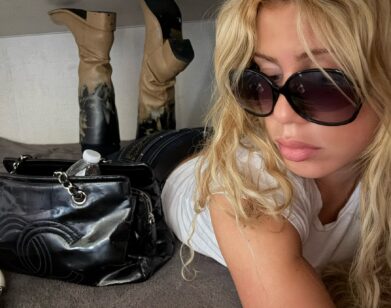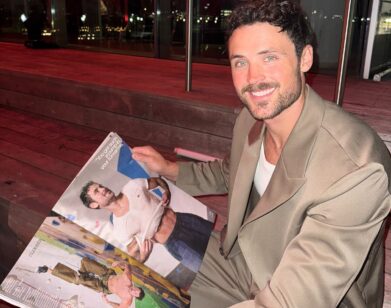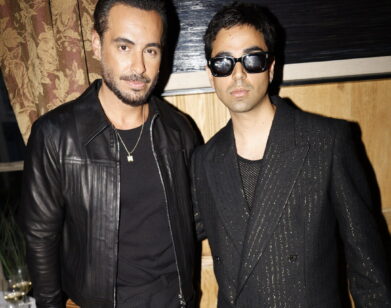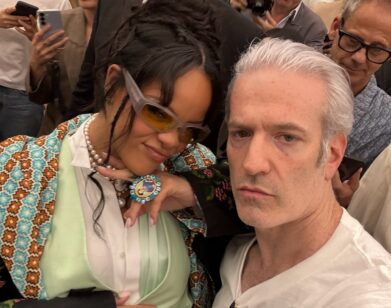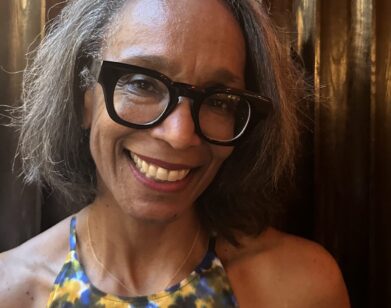Not Quite Legally Blonde
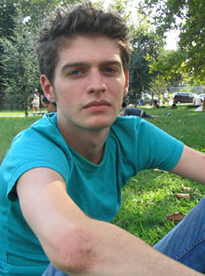
While other undergraduates at Sarah Lawrence were working at glamorous internships, Bennett Madison was honing his storytelling skills as one of Miss Cleo’s phone psychics. Soon after, he turned his knack for spinning convincing fictions into a mystery series about a Nancy Drew type living in a surreal fantasyland called Halo City. Now, at 28, he’s just had his third novel published and, while The Blonde of the Joke is technically for “young adults,” it seems just as likely to appeal to adults (like, people over 20) as its spiritual forebears, Lynda Barry’s Cruddy and the seminal tv series My So-Called Life. I talked to Bennett about the book’s themes: friendship, love, shoplifting, and slutty outfits.
EMILY GOULD: The Blonde of the Joke has a lot of vivid descriptions of shoplifting. Have you ever shoplifted?
BENNETT MADISON: Ha! Barely. I have shoplifted like three things in my life.Â
EG: What did you steal?
BM: A pair of sunglasses from Anthroplogie when I was 16, which I stepped on the day after I stole them. Some art supplies when I was buying a bunch of art supplies and didn’t have money for everything I needed. And once a block of cheddar cheese from C-Town in Morningside Heights.
EG: Wow, that lattermost one is the saddest. Actually they are all pretty sad.
BM: Well art supplies are really expensive so you don’t really feel that bad about it especially if you’re buying other stuff. I think I was like $5 short so I just stole like a couple of erasers or something. Generally I’m not into shoplifting. But you know, shoplifting from most places is really easy. Â
EG: In one of the book’s early scenes, Francie Knight, who is this gorgeous, strange bad girl, tells the protagonist Valentina, who feels boring and invisible, that she has a “sneaky” quality? It’s actually a really good compliment! But do you have to be sneaky to shoplift?
BM: No. Having worked behind the scenes I know that they rely primarily on people’s native fear and guilt as a deterrent to theft. Â
EG: So for a fearless person, like your character Francie Knight, the world really is theirs for the taking?Â
BM: Well, yes, if by “the world” you mean “things from the Gap.” When I worked at the Gap I discovered that the policy was basically never to stop shoplifters. They were afraid of getting it wrong and getting sued.
EG: How do people take off the antitheft tags, do they really use a can opener? Or do they just not even bother? Â
BM: A bottle opener is one of the things you supposedly can use, although I never figured out how to do that. I was really good at taking them off with a rubber band, but that was the old kind of sensorâ??I think with the new ones the rubber band doesn’t really work anymore. Or at least I wasn’t able to do it last time I tried. I used to practice when I was working the register.
EG: The book is full of very excellent descriptions of fabulously tacky clothes and makeup that the protagonists wear, and steal. How did you come up with these? Did you go to Wet Seal for inspiration?
BM: The way Francie dresses is supposed to be dazzling. In her great book, Cruddy, Lynda Barry used the phrase “dazzle camouflage.” And that’s what Francie is kind of trying to doâ??be so outrageous that people kind of try to look away. But also I think she does think it’s beautiful.
EG: Parts of the book gave me the same cozy feeling as a classic cozy book, like I Capture The Castle.Â
BM: I think the book will feel familiar to anyone who has been a suburban teenager, or currently is one. Although I wonder if anyone gets the mall anymore. I mean, the book is sort of supposed to be about the fact that the mall is dying, but maybe to Today’s Teens it’s already dead?
EG:Â Well, it’s also about the fantasy of a new friend coming and saving you from obscurity, changing your life…
BM: I had one friend who was definitely a person who took on a larger than life quality, like I just wanted to be around her all the time. But of course half of it’s projection and then when you realize it’s projection it feels sort of like a betrayal even though it’s your own fault.
EG: These intense friendships are the same as love affairs, in many ways.
BM: Yes, I basically think it’s all the same thing.
EG: It’s like how the 90s cult series My So-Called Life is “about” Rayanne making it possible for Angela to sleep with Jordan, but really it’s so much more important that, via Rayanne, Angela is becoming the kind of person who maybe could be with Jordan.
BM: I’m a little worried that if people look too closely they will notice how much these characters are similar to Rayanne and Angela. In fact, I changed Val’s name from Angel!
EG: The Rayanne myth is as old as time: “Would you stay if she promised you heaven?
BM: I’m sure it’s stolen from something else that’s also stolen from something else that’s stolen from Stevie Nicks. Or maybe a past-life version of Stevie Nicks. But what that TV show is about, and ultimately what the book is about, is: It’s much easier to be friends with an imaginary person.

